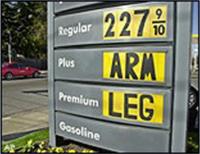
This one from Green Car Congress:
2005 US Salary Increases Go Into the Tank
12 October 2005
An analysis by Salary.com, a provider of compensation-related data, applications, and services, found that the increase in gas prices will effectively wipe out the expected average salary increase (3.7%) for the average worker in the US in 2005.
According to Salary.com’s figures, while average salaries will rise 3.7% year over year, the increase in gasoline prices has effectively cut that average salary by 3.3%. Commuting costs have risen 50% in the last year, as gas prices have risen from $1.91 to $2.81 per gallon.
At the current gas price level and average full-fleet fuel economy of 17.8 miles/gallon, average American workers, who earn the national average salary of $40,409, spend 3.3% of their paychecks ($1,341 per year) on gas needed to commute to and from work.
"And that’s the average worker. Consider workers making the national minimum wage of $5.15 an hour ($10,712 per year) who are currently spending 11.3% of their salary on commuting gas.
Furthermore, $3.00, $4.00, even $5.00 per gallon gas prices no longer seem out of the question."
—Bill Coleman, Senior VP of Compensation
A gas price rise to $5.00 per gallon would cost the average worker $2,384 per year, a whopping 5.9% of their salary.
Salary.com calculated the effective gas price salary cut that workers are taking (by city) as a percentage of the average salary of that city. Some of the highest gas prices in the nation, coupled with above average commute times, landed the upstate New York towns of Rochester and Albany into the top 5. The Texas city of Brownsville showed up at #1, mostly due to the fact that wages are not keeping up with rising gas prices.
To calculate the effective gas price pay cut per metropolitan area, Salary.com used average commute time data from the US Census and the 2004 Urban Mobility Study by the Texas Transportation Institute. Average fuel economy was assumed to be 17.8 miles per gallon, based on the Texas Transportation Institute study. Fuel prices are based on regular grade gasoline as of September 22, 2005, as reported by the American Automobile Association (AAA) Fuel Gauge Report. It is assumed that commuters purchase gas in the city in which they work.
Average salary by metro was calculated by compensation experts at Salary.com and is as of October 1, 2005. All salary dollar values are pretax and based on a 40-hour workweek.
Data is based on a total of 500 commutes per year, to and from work, for 250 workdays. Salary.com assumed that employees work 250 days per year and that their travel is equally split between freeway and arterial street travel. The 88 cities used in the study were the sampling of cities analyzed for congestion by the Texas Transportation Institute.
Perhaps Americans are finally beginning to wake up to what fuel costs are like for much of the rest of the world. Europeans have dealt with even more expensive fuel prices for decades. Perhaps these higher prices will prompt a real change in behavior in Americans, as it has prompted Europeans to drive less/drive more efficient vehicles. Any opinions on what these higher gas prices portent (other than the end of the world ... keep your apocalyptic scenarios to yourself)?
Wednesday, October 12, 2005
Salary increases go straight into the tank
Posted by
Jesse Jenkins
Ads at www.WattHead.org:
Wind Turbine Training
Solar Panels and Kits for the Home
Solar Energy Products and Home Solar Panels
Wind Turbine Training
Solar Panels and Kits for the Home
Solar Energy Products and Home Solar Panels
Subscribe to:
Post Comments (Atom)













No comments:
Post a Comment